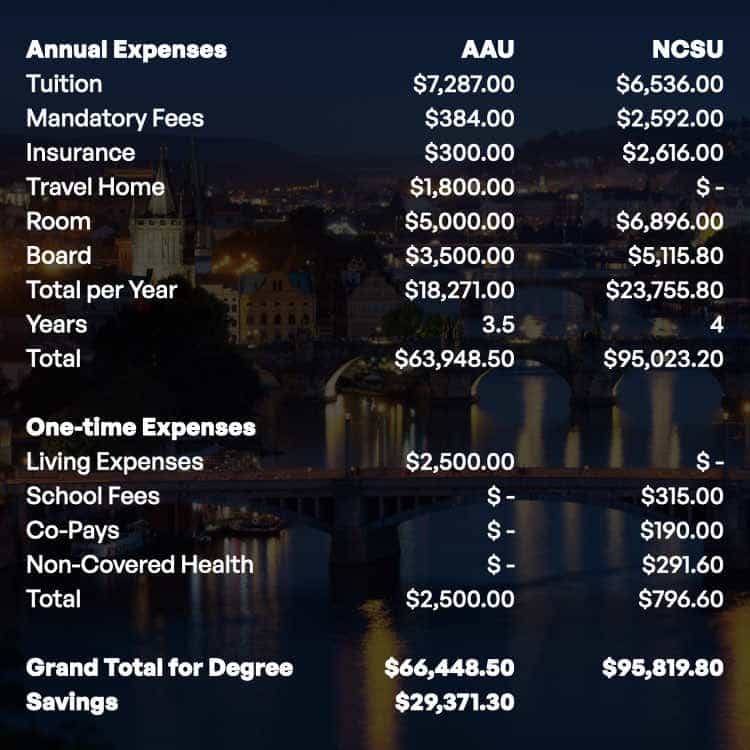Can I Use the GI Bill to Attend College in Europe?
Josh is a former US Marine from Florida who now studies International Relations at the University of Warsaw in Poland. His first international exposure came during his years of overseas duty. His posting to the Marine Corps Embassy Security Group really increased his interest in higher education and stoked a desire for continued international experiences. He also met his now-wife while serving at the US Embassy in Warsaw. Josh’s studies are financed through the GI Bill which, until recently, I didn’t realize could be used to fund college in Europe (more info here). In this post, we’ll explore how to use the GI Bill in foreign schools.
FREE INSIDER’S GUIDE

Top 5 English-Taught Colleges in Europe
Kickstart you education abroad with a powerful degree taught entirely in English, all without taking on any student loans!
US Veterans and Their Families in Europe
- They have gained international exposure through their service.
- They tend to be older and more mature than typical students in the US.
- Their benefits really are confined to state schools in which they live or have residency, since $26,381 won’t go very far for towards out of state or private school tuition.
- Their experience in the military has taught the skills needed to deal with bureaucratic processes that are often involved in studying abroad.
Benefits Under the GI Bill
Benefits under the Post 9/11 GI bill vary based on the amount of time served after 9/11/01. For instance, those who had active duty for 3-5 months get 50% of benefits up to those who served for 36 months, or received a Purple Heart, or had active duty for at least 30 days (without a break) and were discharged for a service-connected disability who get 100% of benefits, including:
- Full tuition for in state tuition, and up to $26,381 for out-of-state or private or international (veterans get in state tuition where they live or have official residence).
- $1,000 per year for books.
- A monthly living allowance, usually averaging $1,833, but can exceed $2,700, depending on where you go to school.
Schools in Europe That Accept GI Bill
There are 870 universities in continental Europe that offer English-taught bachelor’s and/or master’s degree programs. And over 6,000 English-taught programs in these schools accept the GI Bill. The only countries that don’t have any schools that accept the GI Bill are Monaco and Slovenia. All the others countries have options! In fact, more than half of the bachelor’s and master’s degree programs in our database accept the GI Bill!
Of these 6,000+ English taught bachelor’s and master’s degree programs that accept the GI Bill, only 799 have tuition greater than $20,000, nearing the max benefit – and so the takeaway is that there are many, many options. Most of these more expensive programs are either MBA programs, Fine/Performing Arts programs in Sweden, or programs held at American schools with a European campus (surprise…).
Here are just a few examples of universities that offer programs of interests and are fully covered by the GI Bill (assuming the student has 100% benefits) :
Tallinn University of Technology, Tallinn, Estonia
What better place to study cyber security than Estonia? On my first visit there, I was surprised to learn about all their technological advances, their focus on internet connectivity (including free WiFi throughout Tallinn), their impressive e-society, electronic voting, and unique cyber-security programs. This from a country that was under Soviet rule until just 1991! Tal Tech offers both a bachelor’s and master’s degree program in Cyber Security.
The curriculum is designed to provide higher education in the extremely hot field of Cyber Security, integrating software development and IT systems administration. Graduates of this curriculum will be able to independently design, operate and manage secure IT systems. Cyber security personnel are in high demand right now. The unemployment rate in the field is 0% and there are estimates that there will be 3.5 million unfilled positions by 2025.
The university offers a total of 27 English-taught bachelor’s and master’s degree programs, primarily in the fields of business, engineering, technology and computer science. Most of these programs range in tuition from 3,630-6,000 euros per year.
University of Groningen, Groningen, Netherlands
The city of Groningen has a tremendous amount to offer students. It is the youngest city in the Netherlands, with half of the population under the age of 35. Further, 25% of the residents are students. The decentralized campus means that the various university buildings are located throughout the city, which makes the city and university feel very connected-like the town is serving as one big campus. Though it’s a city with a population of more than 200,000, it retains a community feel. Groningen is also a world cycling city and residents say that the city center is busy but quiet, since there are so few cars. Truly an incredible student city!
The University of Groningen is one of the oldest in Europe, founded in 1614. They have a strong international student body, at 20%, representing 120 different countries. I don’t think I could even name 120 countries! This university happens to be #1 in our own in-house Rankings for Best Colleges for 2023.
The university offer 37 bachelor’s and 151 master’s program, all 100% English taught. Not only are there programs representing most study disciplines, but most of them are multidisciplinary in nature. For instance, the International Law program includes courses in political science, economics and international relations. The Life Science and Technology program covers biology, pharmacy, physics, chemistry, and engineering. There is really something for almost everyone here! Most tuition ranges from 10,189 to 18,850 euros per year, all well under the GI Bill spending limit.
University of Bocconi, Milan, Italy
Bocconi just about has it all-triple crown accreditation, a centralized campus in the incredible city of Milan, a truly international approach to education-and, of course, Italian food! They ensure that class size is conducive to interactions and the classroom layout is intentionally designed to create an interactive environment.
Many schools SAY say that they emphasize internationalism, but Bocconi really backs it up. Every professor that has been hired over the last 15 years has had international experiences themselves-they are either non-Italian or an Italian who received their Ph.D in another country. Bocconi sees the value of providing international exposure throughout the study period. Bachelor’s students are required to learn two additional languages during their studies and students are strongly encouraged to study abroad (in some cases it is mandatory).
Given that this is a business school, almost all of the programs are related to economics and management. That said, in addition to pure business programs like Finance and International Management, some programs integrate business with other areas of study. Examples include:
- Economics and Management for Arts, Culture, and Communication
- Green Management, Energy and Corporate Social Responsibility
- Economics and Data Science
- Data Science and Business Analysis
- Economics and Management of Government and International Organizations
Bocconi offers 28 English-taught bachelor’s and master’s degree programs, most of which are less than the tuition covered by the GI Bill.
Find Your Best Fit College
Beyond the States provides information, resources, and a community of like-minded people to help students explore, apply to, and prepare for higher education in Europe. You can easily find European programs taught entirely in English that ALSO accept the GI Bill by becoming a member.











